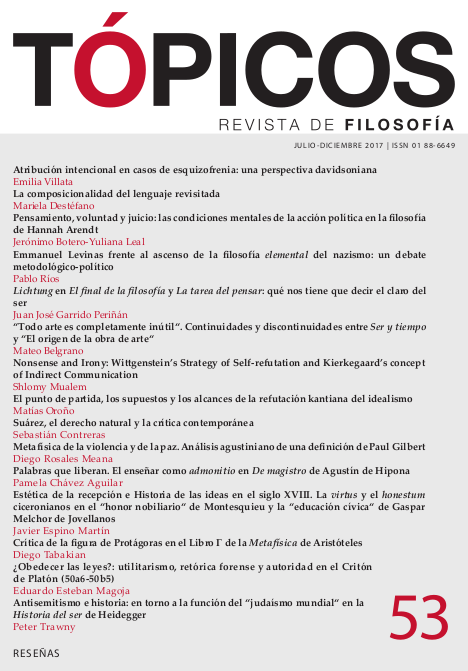Publicado 2017-07-01
Palabras clave
- autonomía,
- compromiso,
- libertad,
- paciencia,
- paz
- poder,
- violencia ...Más
Cómo citar
Resumen
En este trabajo intentaré trazar los lineamientos básicos de una metafísica de la violencia y de la paz en Paul Gilbert y Agustín de Hipona. Para ello, explicitaré los postulados agustinianos sobre los que descansa una definición Gilbert da de la violencia en su libro La paciencia de ser. La definición de Gilbert se pondrá a prueba en tres pasos. En primer lugar, exploraré lo que implica hablar de la violencia en metafísica concebida ésta como una «filosofía primera». En segundo lugar, recuperaré la fenomenología que Agustín de Hipona elabora principalmente en De libero arbitrio. En tercer lugar analizaré la libertad política y su sustitución a través de la noción de «legalidad». De este modo, la violencia quedará caracterizada como la renuncia a lo propiamente político, como la afirmación unilateral de la libertad individual y, por lo tanto, la negación de esa misma libertad.
Referencias
- Agamben, G. (2013). El misterio del mal. Benedicto XVI y el finn de los tiempos. Hidalgo, A. (ed.) D ́Meza, M. T. (trad.) Buenos Aires.
- Agustín de Hipona, san (ciu.). La ciudad de Dios. Madrid: Biblioteca de Autores Cristianos.
- ____ (Gn. li .). Comentario literal al Génesis. Madrid: Biblioteca de Autores Cristianos.
- ____ (conf.). Confesiones. Madrid: Biblioteca de Autores Cristianos. Trad. de Ángel Custodio vega.
- ____ (exc. urb.). La devastación de Roma. Madrid: Biblioteca de Autores Cristianos.
- ____ (qu. Mt.). Dieciséis cuestiones sobre el Evangelio de Mateo. Madrid: Biblioteca de Autores Cristianos.
- ____ (an. quant.). La dimensión del alma. Madrid: Biblioteca de Autores Cristianos.
- ____ (doctr. chr.). La doctrina cristiana. Madrid: Biblioteca de Autores Cristianos.
- ____ (en. in Ps.). Enarraciones sobre los Salmos. Madrid: Biblioteca de Autores Cristianos.
- ____ (imm. An.). La inmortalidad del alma. Madrid: Biblioteca de Autores Cristianos.
- ____ (lib. arb.). El libre albedrío. Madrid: Biblioteca de Autores Cristianos.
- ____ (s.) Sermones. Madrid: Biblioteca de Autores Cristianos.
- Anders, G. (2002). La obsolescencia del hombre I. Sobre el alma en la época de la segunda revolución industrial. Monter Pérez, J. (trad.) Valencia: Pre-Textos.
- Arendt, H. (1958). The Human Condition. Chicago & London: The University of Chicago Press.
- ____ (1971). La vida del espíritu. Montoro. R. y Vallespín F. (trad.) Madrid: Centro de Estudios Constitucionales, 1984.
- ____ (1969). On Violence. Harcourt: New York.
- Aristóteles (Met.). Metafísica. Valentín García Yebra (trad.) Madrid: Editorial Gredos.
- Barnes, J. (1979). Los presocráticos. Martín López, E. (trad.) Madrid: Ediciones Cátedra.
- Esquirol, J. M. (2015). La resistencia íntima. Ensayo de una filosofía de la proximidad. Barcelona: Acantilado.
- Filippi, S. (2015). En torno a la ‘Metafísica del Éxodo’. En Studia Gilsoniana 4, 2, abril-junio, 99-115.
- Gilbert, P. (2009). Violence et compassion. Essai sur l’authenticité d’être. Paris: Éditions du Cerf.
- ____ (2004). La violencia del principio. En Silva, E., Scannone, J. y Durán, V. (eds.) Problemas de filosofía de la religión desde América Latina. La religión y sus límites. (75-107). Bogotá: Siglo del Hombre Editores y Equipo Jesuita Latinoamericano de Reflexión Filosófica.
- ____ (1996). Metafísica. La paciencia de ser. Peña Eguren, E. (trad.) Salamanca: Ediciones Sígueme.
- ____ (1988). Pour une métaphysique réflexive. En Gregorianum, 69, 1, 77- 116.
- Gilson, E. (1929). Introduction à l’étude de saint Augustin. Paris: Vrin.
- ____ (1948). L’esprit de la philosophie médiévale. Paris: Vrin.
- Gutiérrez, G. (1986). Hablar de Dios desde el sufrimiento del inocente. Salamanca: Ediciones Sígueme.
- Havel, V. (1985). El poder de los sin poder y otros escritos. Madrid: Ediciones Encuentro.
- Illich, I. & Cayley, D. (2005) The Age of Systems. En The Rivers North of the Future. (157-168). Toronto: House of Anansi Press Inc. Foreword by Charles Taylor.
- Ireneo de Lyon, san. (Adv. haer.) (2001) Contra los herejes. Exposición y refutación de la falsa gnosis. González, C. I. (trad.) México: Conferencia del Episcopado Mexicano.
- Lévinas, E. (1995). Totalité et in ni. Essai sur l’exteriorité. La Haya: Martinus Nihjoff.
- Medina, J. (2013). El Dios otro. La ética de Lévinas. En Revista de filosofía Open Insight, V (5), 81-98.
- Mayer, C. (ed.) (1986 sqq). Augustinus Lexikon (3 vol.). Basel / Stuttgart: Schwabe & Co. AG.
- Rahner, K. (1964). Teología del poder. En Escritos de teología. Tomo 4.
- Molina, J. (trad.) (495-517). Madrid: Taurus Ediciones.
- Robert, J. y Majid Rahnema (2008). La puissance des pauvres. Paris: Actes Sud.
- Taylor, C. (1985). Atomism. En Philosophical Papers 2. Philosophy and the Human Sciences. Cambridge: Cambridge University Press.
- Zoja, Luigi. (2009). La muerte del prójimo. Ruschi, M. (trad.) México: Fondo de Cultura Económica, 2015.







